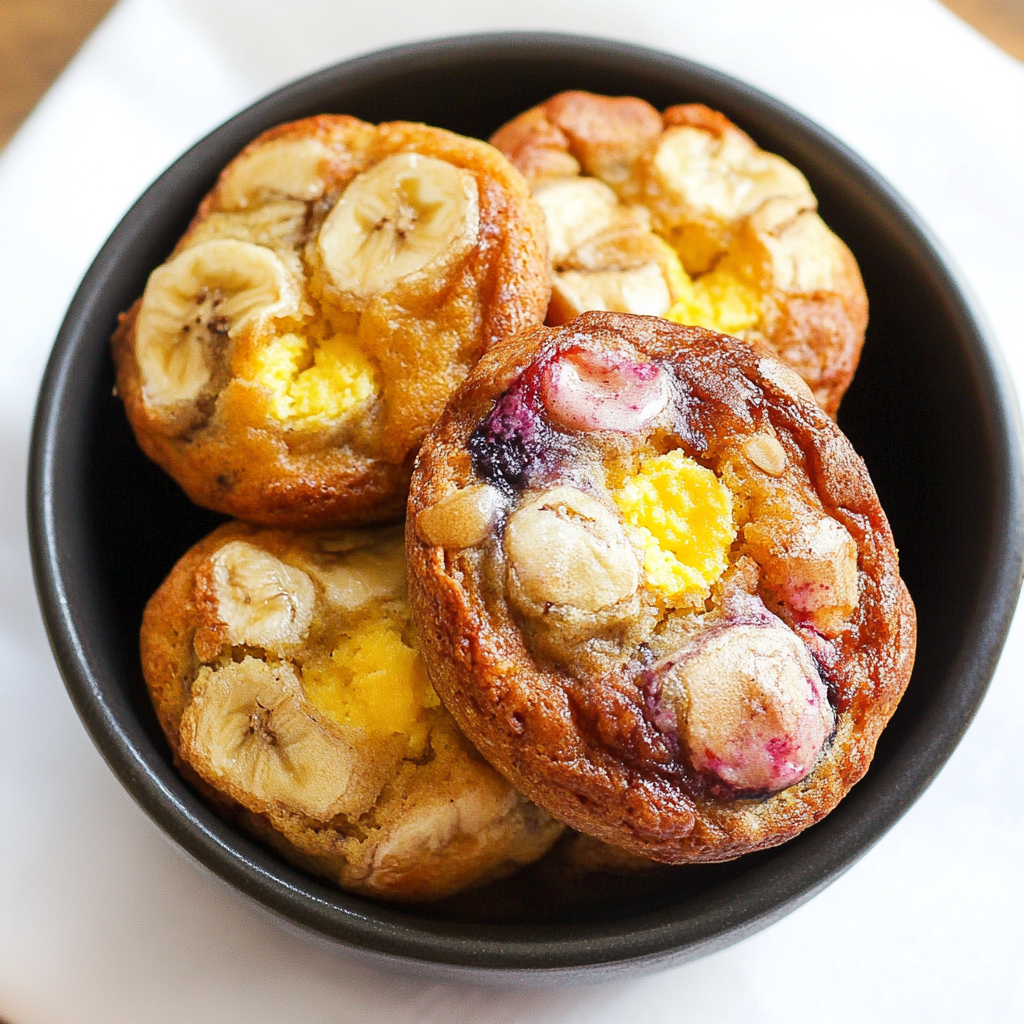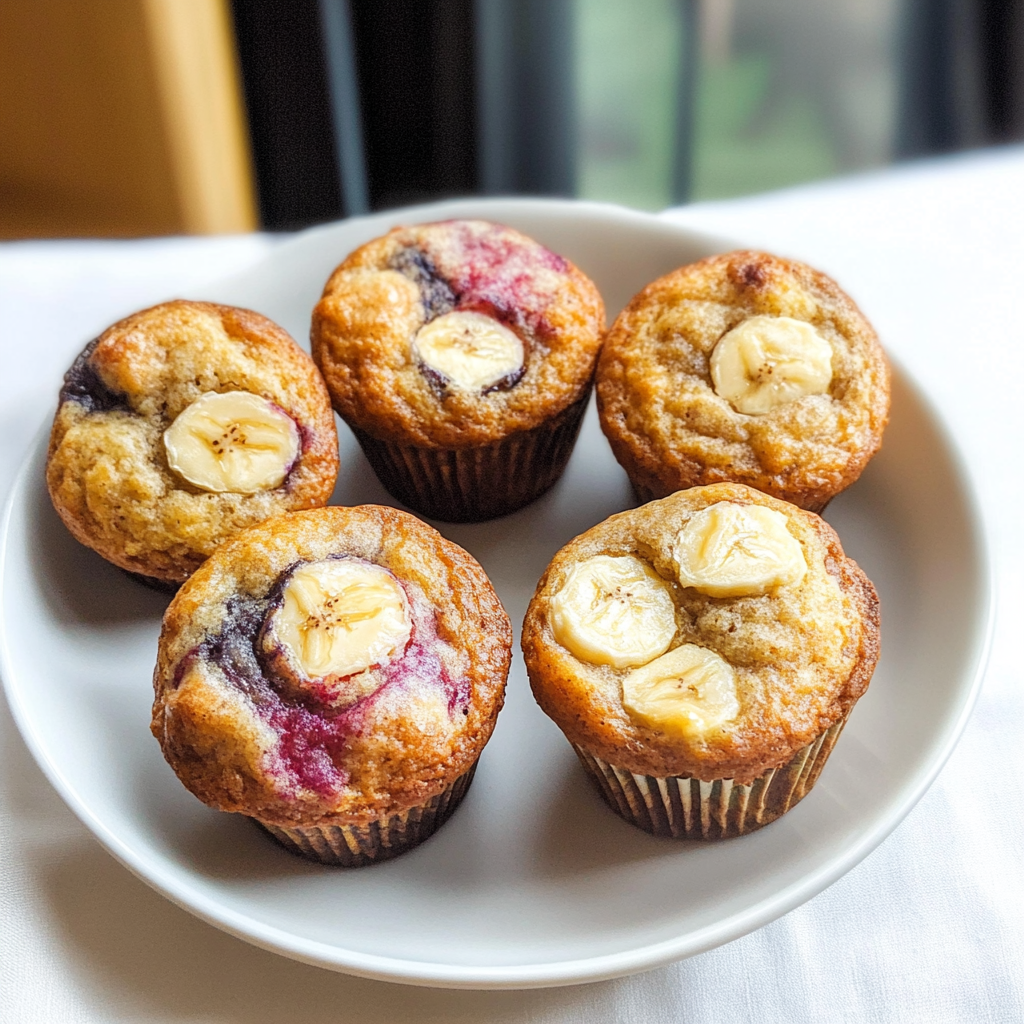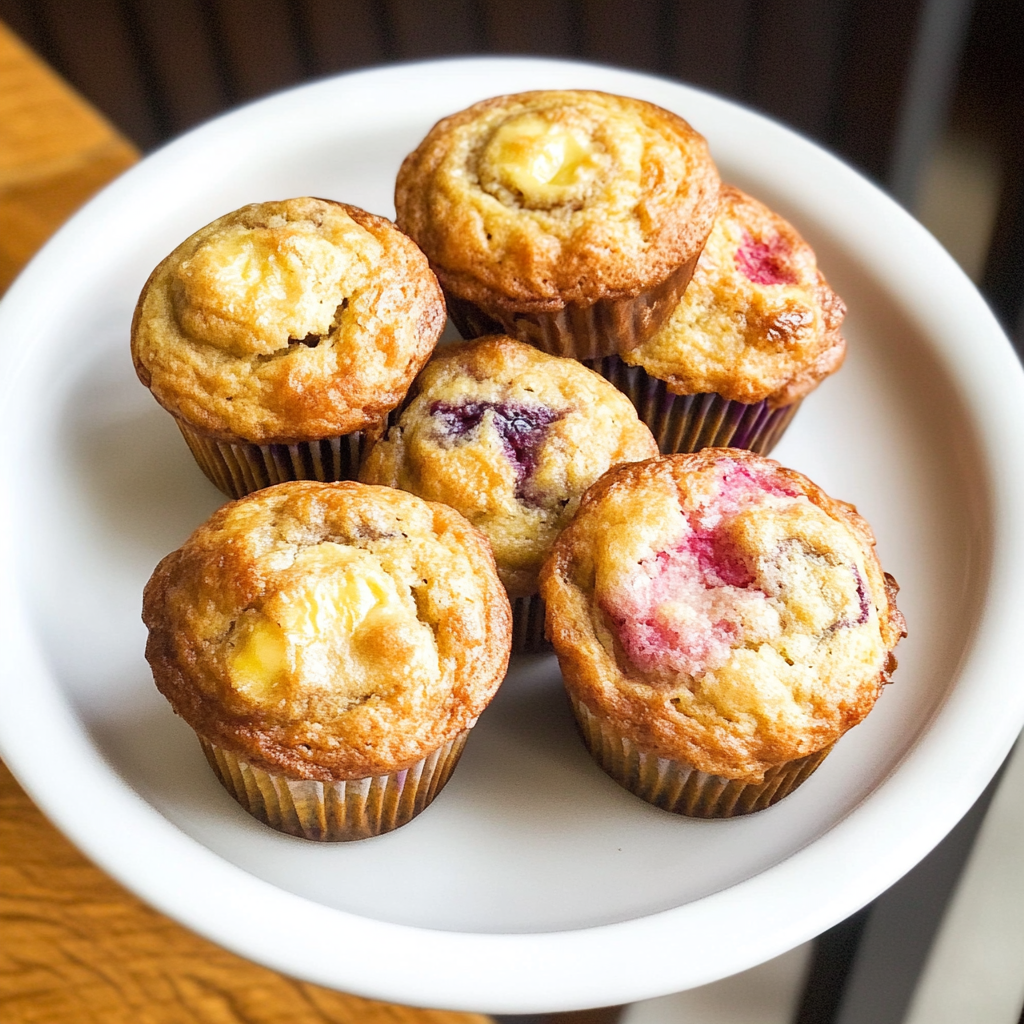When looking into alternative baking ingredients, a common query is, “Can you use bananas as an egg substitute in muffins?” This approach offers a plant-based option for those avoiding eggs due to allergies, dietary preferences, or ethical reasons. Bananas are readily available and can provide additional nutritional benefits, making them an appealing substitute in various baking recipes, especially in muffins.
Table of Contents
The Role of Eggs in Muffin Recipes
Eggs play a vital part in baking, especially in muffins. They contribute to the structure by binding the ingredients together, ensuring that the muffin rises properly during baking. Understanding this role is crucial when considering bananas as a substitute. This knowledge assists in adjusting recipes to maintain the desired outcome without compromising the muffin’s texture or flavor.

Learn how to balance wet and dry ingredients for optimal muffin texture in our article on avoiding soggy muffins.
Benefits of Using Bananas Instead of Eggs
There are multiple benefits when you choose bananas over eggs in muffin recipes. Notably, bananas can enhance the muffins’ flavor with a natural sweetness, allowing for a reduction in added sugars. Additionally, they increase the dietary fiber content, which can aid in digestion. This substitution also caters to vegan diets and those with egg allergies, broadening the appeal of your muffin recipes to a wider audience.
How to Substitute Bananas for Eggs in Muffins
To substitute bananas for eggs in muffin recipes effectively, the general guideline is to use one ripe, mashed banana for every egg replaced. This ratio helps maintain moisture and cohesiveness in the batter. It’s critical to select ripe bananas, as they are softer and sweeter, which enhances the overall texture and taste of the muffins.
- Mash the banana thoroughly to ensure a smooth consistency.
- Mix with other wet ingredients before combining with dry ingredients.
- Reduce the sugar in the recipe if desired, as bananas add natural sweetness.

Ideal Muffin Types for Banana Substitution
Certain types of muffins are more suited to banana substitution than others. Muffins with flavors that naturally complement bananas, such as chocolate, vanilla, or cinnamon, are ideal candidates. This compatibility allows the banana flavor to blend seamlessly into the overall taste profile of the muffins, enhancing rather than overpowering the desired flavor.
Potential Drawbacks of Using Bananas
While there are many positive aspects to using bananas as an egg substitute, some drawbacks exist. The most notable is the potential for a denser muffin texture, as bananas do not provide the same leavening properties as eggs. Additionally, the distinct banana flavor might not be suitable for all types of muffins, potentially altering the intended taste.

Texture and Taste Considerations
When substituting bananas for eggs, it’s important to consider how this changes the texture and taste of the muffins. Bananas can make the muffins moister but may also result in a heavier texture. The sweet, distinct flavor of bananas will also be more pronounced, which could be a delightful twist or a mismatch, depending on the other ingredients used.
Nutritional Comparisons: Bananas vs. Eggs
Nutritionally, bananas and eggs differ significantly. Bananas provide higher amounts of dietary fiber, potassium, and vitamin C, but lack the protein and fats provided by eggs. For those managing dietary restrictions or preferences, these differences might impact the choice to substitute bananas in muffin recipes.
By understanding the roles, benefits, and considerations of using bananas as an egg substitute, bakers can experiment with this substitution to create muffins that cater to various tastes and dietary needs.
Adjusting Your Muffin Recipes for Banana Use
Can You Use Bananas as an Egg Substitute in Muffin Recipes? Making Adjustments
Incorporating bananas as an egg substitute in muffins is not just about adding a mashed banana to the mix. The substitution affects texture, moisture, and flavor. To effectively use bananas as an egg substitute in muffins, one should aim to replace each egg with one-quarter cup of mashed banana. Adjustments might be necessary to reduce other liquids in the recipe to maintain balance. It’s essential to consider the type of muffin you’re baking. For instance, bananas work well in recipes that naturally complement their flavor, such as chocolate or nut-based muffins.
Alternative Egg Substitutes in Muffin Baking
What Are the Best Alternatives if You Can’t Use Bananas as an Egg Substitute in Muffins?
While bananas are a popular choice, other substitutes also offer unique benefits. Applesauce and yogurt serve as excellent alternatives, providing moisture without overwhelming the flavor. A quarter cup of either can replace one egg. For those who prefer a less noticeable taste change, a mixture of water, oil, and baking powder can mimic eggs’ binding properties. Here are several options:
- Applesauce: Best for adding moisture without fat.
- Yogurt: Contributes to a rich texture.
- Flaxseeds: Ground flaxseeds mixed with water offer a healthful twist.
Common Mistakes When Using Banana as a Substitute
Using bananas as an egg substitute in muffins is straightforward but prone to common pitfalls. A typical mistake is using too much banana, which can lead to overly dense and moist muffins. Ensure the bananas are adequately ripe; underripe bananas lack the necessary sweetness and moisture. Another error is neglecting to adjust sugar levels in the recipe, as bananas add natural sweetness. A careful balance is needed to maintain the desired flavor profile.
Expert Tips for Baking with Bananas
Expert Tips: Can You Use Bananas as an Egg Substitute in Muffins Successfully?
Professionals suggest several strategies to enhance muffin quality when using bananas as an egg substitute. First, use bananas that are ripe to overripe, as they are softer and sweeter, blending seamlessly into the batter. Mixing should be done gently to avoid developing tough textures. For a harmonious flavor, integrate spices such as cinnamon or nutmeg, which complement the banana’s richness. Finally, consider adding small chunks of banana to the batter for textural variety and bursts of flavor.
The Science Behind Bananas as an Egg Substitute
Bananas work as an egg substitute due to their ability to bind ingredients and retain moisture. This is thanks to their natural sugars and fibrous texture. While eggs help in aeration, bananas mainly contribute moisture and a slight sweetness, which is ideal for recipes like muffins. By understanding this difference, bakers can better anticipate the results when using bananas instead of eggs.
FAQs on Banana Substitution in Muffins
Can bananas replace eggs in all muffin recipes?
Yes, bananas can be used as an egg substitute in most muffin recipes, but they work best in recipes that complement their flavor, such as chocolate, cinnamon, or nut-based muffins.
How much banana should I use to replace one egg?
Generally, use 1/4 cup of mashed ripe banana (approximately half a banana) to replace one egg in a recipe.
Will the muffins taste like bananas if I use them as a substitute?
Yes, bananas have a distinct flavor that will be noticeable in the muffins. If the banana flavor is too strong for your liking, consider using other substitutes like applesauce or yogurt.
Can I use underripe bananas for substitution?
It’s best to use ripe or overripe bananas as they are sweeter, softer, and easier to mash, which helps achieve the desired texture and flavor in muffins.
Do bananas affect the texture of muffins?
Yes, bananas make muffins moister and denser compared to eggs. This can be an advantage in some recipes but may not suit others where a light, fluffy texture is desired.
Should I adjust the sugar in the recipe when using bananas?
Since bananas are naturally sweet, you may want to reduce the amount of sugar in your recipe to prevent the muffins from being overly sweet.
Can bananas provide the same leavening properties as eggs?
No, bananas do not offer the same leavening properties as eggs. To achieve fluffier muffins, consider adding a leavening agent like baking powder or baking soda.
Are bananas a healthy egg substitute?
Yes, bananas are a nutritious alternative. They are rich in dietary fiber, potassium, and vitamins while being low in fat and cholesterol, making them suitable for vegan diets or those with egg allergies.
Can I freeze muffins made with bananas as a substitute?
Absolutely. Wrap the muffins individually in plastic wrap and store them in a freezer-safe bag. They can be frozen for up to three months. Thaw at room temperature or reheat in the microwave for a fresh taste.
Storing and Freezing Tips for Banana Muffins
Tips on Storing and Freezing Muffins When Using Bananas as an Egg Substitute
To keep muffins fresh and tasty, store them in an airtight container at room temperature for up to three days. For longer storage, freezing is an excellent option. Wrap individual muffins in plastic wrap and place them in a freezer-safe bag. They can be frozen for up to three months. Thaw at room temperature or microwave briefly for a quick snack.
Exploring Other Fruit-Based Egg Alternatives
Beyond bananas, other fruits can act as egg substitutes in muffin recipes. Pureed pears or pumpkin can be used in similar quantities to bananas and offer their unique flavors and benefits. These alternatives work well in recipes that require a subtle, sweet enhancement or complement specific spices and ingredients.
Conclusion: Is Banana the Right Choice for Your Muffins?
Deciding whether to use bananas as an egg substitute in muffins depends on several factors, including taste preference, desired texture, and nutritional considerations. For those who enjoy a moister, denser muffin and appreciate the health benefits of bananas, this substitute can be an excellent choice. Experimenting with the amount and mixing technique can help achieve the best results tailored to personal taste and dietary needs.

